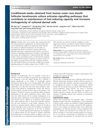1 citations,
December 2019 in “World rabbit science” High doses of cobalt stopped hair growth in rabbits.
November 2019 in “BMC veterinary research” The hair loss in Belgian Blue crossbred calves was caused by a diet issue, not by disease or infection.
13 citations,
April 2002 in “International Journal of Toxicology” The safety of placental and umbilical extracts in cosmetics is uncertain, requiring more research.
 April 2017 in “Journal of dermatology & cosmetology”
April 2017 in “Journal of dermatology & cosmetology” The marine protein complex, Viviscal®, was found to effectively reduce hair loss and improve hair, skin, and nails quality in women.
 21 citations,
September 1990 in “Journal of The American Academy of Dermatology”
21 citations,
September 1990 in “Journal of The American Academy of Dermatology” Taking L-tryptophan supplements might cause a condition similar to scleroderma in some people, which can get better after stopping the supplement and starting corticosteroid therapy.
 19 citations,
September 2010 in “The American journal of pathology”
19 citations,
September 2010 in “The American journal of pathology” High glucocorticoids cause pancreatic malfunction and malabsorption, reversible with enzyme supplements.
 1 citations,
March 2022 in “IntechOpen eBooks”
1 citations,
March 2022 in “IntechOpen eBooks” Collagen is crucial for health and treating certain diseases, and supplements can improve skin, nails, and hair conditions.
 22 citations,
January 2015 in “Dermatology Research and Practice”
22 citations,
January 2015 in “Dermatology Research and Practice” An extra-strength marine protein supplement helped increase hair growth and decrease hair shedding in women with thinning hair.
 3 citations,
April 2022 in “Farmacia”
3 citations,
April 2022 in “Farmacia” Certain foods and supplements can help treat skin diseases alongside medication.
27 citations,
January 2015 in “International Journal of Trichology” The supplement helps improve hair growth and reduce hair shedding.
 December 2023 in “Research in pharmacy”
December 2023 in “Research in pharmacy” Phytotherapeutic compounds and supplements can help manage Polycystic Ovarian Syndrome (PCOS).
 7 citations,
February 2016 in “Dermatology and therapy”
7 citations,
February 2016 in “Dermatology and therapy” t-Flavanone helps improve male pattern hair loss by making hair roots stronger.
 27 citations,
March 2018 in “Biomaterials”
27 citations,
March 2018 in “Biomaterials” Three specific proteins can turn adult skin cells into hair-growing cells, suggesting a new hair loss treatment.
5 citations,
September 2023 in “Nutrients” Soy protein with isoflavones reduces wrinkles and improves skin hydration in postmenopausal women.
 October 2018 in “InTech eBooks”
October 2018 in “InTech eBooks” The most effective treatments for hair loss are minoxidil, finasteride, PRP, and hair transplants, with steroids and immunosuppressants for autoimmune types.
 126 citations,
January 2009 in “International Journal of Trichology”
126 citations,
January 2009 in “International Journal of Trichology” Oxidative stress contributes to hair graying and loss as we age.
 1 citations,
August 2000 in “Expert Opinion on Therapeutic Patents”
1 citations,
August 2000 in “Expert Opinion on Therapeutic Patents” Boosting mitochondrial energy production with supplements like acetyl-L-carnitine may improve aging-related cellular function and health conditions.
 3 citations,
April 2022 in “Clinical, Cosmetic and Investigational Dermatology”
3 citations,
April 2022 in “Clinical, Cosmetic and Investigational Dermatology” Different methods, including stress management, healthy diet, supplements, and treatments like minoxidil, can help hair grow back after COVID-19 related hair loss.
 27 citations,
March 2012 in “Dermatologic Therapy”
27 citations,
March 2012 in “Dermatologic Therapy” Taking zinc supplements can help improve or cure hair loss caused by zinc deficiency.
6 citations,
October 2015 in “Experimental dermatology” Adenine helps delay aging in human hair follicle cells.
 6 citations,
July 2012 in “Experimental Dermatology”
6 citations,
July 2012 in “Experimental Dermatology” The substance from human hair root cells can help maintain hair growth and make skin cells more capable of growing hair.
 September 2022 in “JAMC. Journal of Ayub Medical College, Abbotabad, Pakistan/Journal of Ayub Medical College”
September 2022 in “JAMC. Journal of Ayub Medical College, Abbotabad, Pakistan/Journal of Ayub Medical College” A boy with a rare skin condition improved quickly after starting zinc supplements.
 2 citations,
May 2017 in “International journal of pharmacy and pharmaceutical sciences/International Journal of Pharmacy and Pharmaceutical Sciences”
2 citations,
May 2017 in “International journal of pharmacy and pharmaceutical sciences/International Journal of Pharmacy and Pharmaceutical Sciences” Hutchinson-Gilford Progeria Syndrome is a rare genetic disorder caused by a specific gene mutation, characterized by aging symptoms and managed by monitoring heart health and using low-dose aspirin.
 January 2022 in “International journal of zoological investigations”
January 2022 in “International journal of zoological investigations” Polycystic Ovarian Syndrome is common in overweight urban college girls and may increase the risk of heart and metabolic problems.
 114 citations,
October 2009 in “Gastroenterology”
114 citations,
October 2009 in “Gastroenterology” Zinc is crucial for nutrition, especially in patients with specific health conditions, and requires careful supplementation and monitoring.
 3 citations,
August 2020 in “Nutrition Journal”
3 citations,
August 2020 in “Nutrition Journal” Spinach-derived thylakoid supplements plus a low-calorie diet helped obese women with polycystic ovary syndrome lose weight and improve their metabolism.
 18 citations,
September 2011 in “Livestock science”
18 citations,
September 2011 in “Livestock science” Maternal Nano-Se supplements improve fetal hair follicle development in cashmere goats.
 2 citations,
December 2018 in “Journal of cosmetic dermatology”
2 citations,
December 2018 in “Journal of cosmetic dermatology” Higher CRBP1 levels are linked to more severe alopecia areata.
 10 citations,
January 2012 in “International Journal of Trichology”
10 citations,
January 2012 in “International Journal of Trichology” The study found no link between anxiety, vitamin B12, folate, TSH, ferritin, zinc levels, and trichodynia in telogen alopecia patients.
 18 citations,
April 2011 in “International Journal of Molecular Medicine”
18 citations,
April 2011 in “International Journal of Molecular Medicine” Dihydrotestosterone causes p27 protein breakdown in ovarian and breast cancer cells by binding with SKP2.























